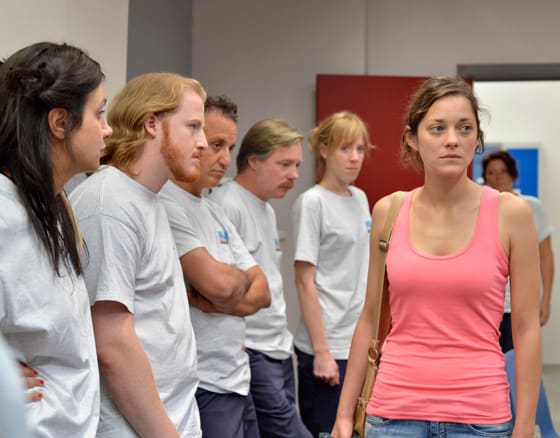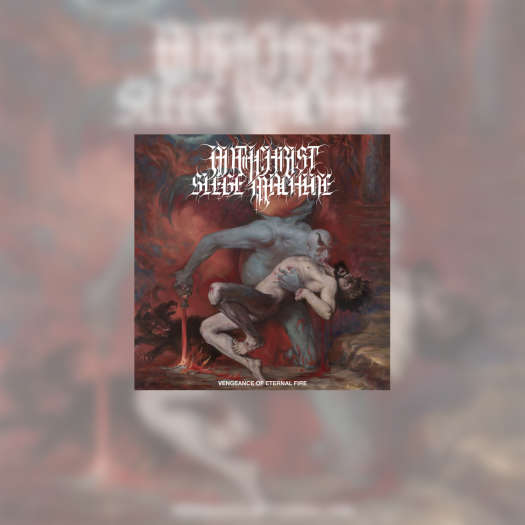Staying true to their aesthetic and thematic auteur trajectory, Jean-Pierre and Luc Dardenne's latest work, Two Days, One Night, utilizes protracted takes with a handheld camera — free from non-diegetic sound — to heighten the authenticity of an economically and morally conscious story. Money, or lack thereof, is the instigator of human conflict here, motivating the characters to make morally ambiguous decisions and step outside of their comfort zones to survive.
Our protagonist, Sandra (Marion Cotillard), learns that her co-workers have taken a vote to receive a substantial annual bonus in lieu of keeping her employed. Having just come back from disability leave for depression, she's vulnerable financially and emotionally, exacerbating the stakes of a situation that is further complicated by a managerial decision to have a second vote, free from influence, after the weekend.
This leaves Sandra the titular "two days and one night" to track down all of her co-workers at their homes to try and convince them to give up their bonus to save her job.
Understandably, these discussions are exceedingly discomforting. Most of her co-workers express different degrees of defensiveness, consistently trying to dig up information from her about what their peers might have had to say about the subject. The situation is problematic for a variety of reasons that are explored in excruciating yet compelling detail; some people surprise Sandra with their compassion, while others respond with outright hostility.
Cotillard, tasked with balancing a fragile disposition with her simultaneous anger and insecurity at having to engage people keen to avoid her, anchors the film. It's her keen attention to character nuance and ability to communicate hesitancy, anger and slight compassion in a single gaze that makes these encounters so naturalistic and anxiety inducing. These moments never appear manufactured or contrived, having a believability and unpredictability that ensures that we, as an audience, are never complacent or feel that we can predict an outcome that should, technically, be foregone.
Though the overall moral lexicon of the film indirectly preaches Communist values, indulging in the worst end of the spectrum of modern counter-cultural ethos, the Dardennes never sensationalize the material or force the didactic. The focus is always the inherent sincerity of any given moment and remaining true to the plausible progression of a story guided by its characters rather than its message.
As such, Two Days, One Night has a lingering effect, offering a dialogue about the very nature of humanity. Considering that this story could easily become wrapped up in, and defied by, its own logic or the need to exaggerate the situations to ensure the repetitive motifs remain vital, the seeming subtlety and focus on key authentic narrative signifiers proves particularly impressive and thought-provoking.
(Mongrel Media)Our protagonist, Sandra (Marion Cotillard), learns that her co-workers have taken a vote to receive a substantial annual bonus in lieu of keeping her employed. Having just come back from disability leave for depression, she's vulnerable financially and emotionally, exacerbating the stakes of a situation that is further complicated by a managerial decision to have a second vote, free from influence, after the weekend.
This leaves Sandra the titular "two days and one night" to track down all of her co-workers at their homes to try and convince them to give up their bonus to save her job.
Understandably, these discussions are exceedingly discomforting. Most of her co-workers express different degrees of defensiveness, consistently trying to dig up information from her about what their peers might have had to say about the subject. The situation is problematic for a variety of reasons that are explored in excruciating yet compelling detail; some people surprise Sandra with their compassion, while others respond with outright hostility.
Cotillard, tasked with balancing a fragile disposition with her simultaneous anger and insecurity at having to engage people keen to avoid her, anchors the film. It's her keen attention to character nuance and ability to communicate hesitancy, anger and slight compassion in a single gaze that makes these encounters so naturalistic and anxiety inducing. These moments never appear manufactured or contrived, having a believability and unpredictability that ensures that we, as an audience, are never complacent or feel that we can predict an outcome that should, technically, be foregone.
Though the overall moral lexicon of the film indirectly preaches Communist values, indulging in the worst end of the spectrum of modern counter-cultural ethos, the Dardennes never sensationalize the material or force the didactic. The focus is always the inherent sincerity of any given moment and remaining true to the plausible progression of a story guided by its characters rather than its message.
As such, Two Days, One Night has a lingering effect, offering a dialogue about the very nature of humanity. Considering that this story could easily become wrapped up in, and defied by, its own logic or the need to exaggerate the situations to ensure the repetitive motifs remain vital, the seeming subtlety and focus on key authentic narrative signifiers proves particularly impressive and thought-provoking.




